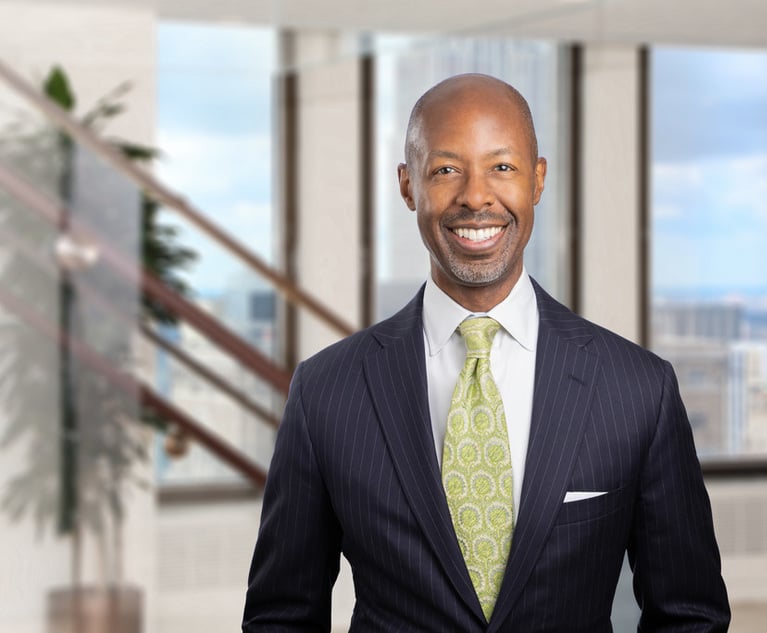 Herb Rubin is a 100-year-old attorney who still practices. (Photo: David Handschuh/ALM)
Herb Rubin is a 100-year-old attorney who still practices. (Photo: David Handschuh/ALM)Law Firms Ease Mandatory Retirement Policies, but Tensions Remain
"It's like going to high school when the seniors never graduate and the seniors are the partners," said Terrence Tarver, a personal injury lawyer who chairs the young lawyers section of the state bar association.
February 04, 2019 at 11:29 AM
6 minute read
When Herb Rubin's partner died, he was recruited by a big law firm with a mandatory retirement age. Rubin, 100, the name partner at Herzfeld & Rubin, is glad that he turned that offer down. Otherwise, he would have been forced to retire 35 years ago.
Paul Weiss partner Mordie Rochlin, 106, did retire 35 years ago when he reached the firm's mandatory retirement age of 70. But Rochlin couldn't imagine life without the firm, so he never actually left.
 Mordie Rochlin, who is 106, still has an office and an assistant at Paul Weiss 35 years after his retirement. (Photo: David Handschuh/ALM)
Mordie Rochlin, who is 106, still has an office and an assistant at Paul Weiss 35 years after his retirement. (Photo: David Handschuh/ALM)
“As you might imagine, some of my partners welcome retirement and may even choose to retire before their mandatory retirement age is hit,” said Paul Weiss Chairman Brad Karp. “Others strongly resist retirement and would prefer to work well beyond their designated retirement age. They'll point to my partner Mordie Rochlin, who still comes to the office at age 106.”
Nearly 40 percent of law firms had mandatory retirement ages 15 years ago, according to a study conducted by Altman Weil for the American Bar Foundation. But, when the American Lawyer surveyed 68 firms in 2016, only 16 mostly elite firms still had an age cutoff. In the past couple of years, law firm leaders have acknowledged making exceptions for lawyers who bring in the most business.
While policies differ, one thing is consistent across the industry: Older lawyers who want to stay resent being pushed out, but younger lawyers don't think their elders are turning over the business soon enough. Terrence Tarver, 39, a personal injury lawyer who chairs the young lawyers section at the New York State Bar Association, objects to mandatory retirement policies but understands why they're popular among his peers.
“It's like going to high school when the seniors never graduate and the seniors are the partners,” said Tarver who stressed he wasn't speaking for the state bar.
A third of respondents to ALM Intelligence's 2016 law firm leaders survey said that senior partners are keeping work that they should have passed on to the next generation, and more than 60 percent said some partners are staying on too long.
Eric Seeger, a principal at Altman Weil who specializes in succession planning, agrees that there is a generational divide.
“Anecdotally, it's consistent with my experience that younger lawyers tend to want the senior lawyers to move on, and the senior lawyers resent being asked to leave,” Seeger said.
Former Chief Judge Jonathan Lippman, who reluctantly left the Court of Appeals when he hit the mandatory retirement age of 70 in 2015, was at the annual meeting of the state bar in January to hand out pro bono awards named in his honor. The awards were given by the senior lawyers section, which had gathered to discuss how senior lawyers can lead productive professional lives well into old age.
 Former Chief Judge Jonathan Lippman speaks at the senior lawyers section meeting at the New York State Bar Association conference in New York on Jan. 17. (Photo: David Handschuh/ALM)
Former Chief Judge Jonathan Lippman speaks at the senior lawyers section meeting at the New York State Bar Association conference in New York on Jan. 17. (Photo: David Handschuh/ALM)
“I think the answer is we have to as a profession place more of a value on lawyers' expertise,” said Lippman, who was a proponent of a failed 2013 ballot proposition to raise the age limit for judges. “There is a tendency in our society to downplay wisdom and experience.”
Henry “Hank” Greenberg, a shareholder at Greenberg & Traurig and president-elect of the state bar, said law firm mandatory retirement policies should be eliminated and the retirement age for judges raised.
This content has been archived. It is available through our partners, LexisNexis® and Bloomberg Law.
To view this content, please continue to their sites.
Not a Lexis Subscriber?
Subscribe Now
Not a Bloomberg Law Subscriber?
Subscribe Now
NOT FOR REPRINT
© 2024 ALM Global, LLC, All Rights Reserved. Request academic re-use from www.copyright.com. All other uses, submit a request to [email protected]. For more information visit Asset & Logo Licensing.
You Might Like
View All
Attorneys 'On the Move': Structured Finance Attorney Joins Hunton Andrews Kurth; Foley Adds IP Partner
4 minute read

NY Civil Liberties Legal Director Stepping Down After Lengthy Tenure

Former Top Aide to NYC Mayor Is Charged With Bribery Conspiracy
Trending Stories
- 1Call for Nominations: Elite Trial Lawyers 2025
- 2Senate Judiciary Dems Release Report on Supreme Court Ethics
- 3Senate Confirms Last 2 of Biden's California Judicial Nominees
- 4Morrison & Foerster Doles Out Year-End and Special Bonuses, Raises Base Compensation for Associates
- 5Tom Girardi to Surrender to Federal Authorities on Jan. 7
Who Got The Work
Michael G. Bongiorno, Andrew Scott Dulberg and Elizabeth E. Driscoll from Wilmer Cutler Pickering Hale and Dorr have stepped in to represent Symbotic Inc., an A.I.-enabled technology platform that focuses on increasing supply chain efficiency, and other defendants in a pending shareholder derivative lawsuit. The case, filed Oct. 2 in Massachusetts District Court by the Brown Law Firm on behalf of Stephen Austen, accuses certain officers and directors of misleading investors in regard to Symbotic's potential for margin growth by failing to disclose that the company was not equipped to timely deploy its systems or manage expenses through project delays. The case, assigned to U.S. District Judge Nathaniel M. Gorton, is 1:24-cv-12522, Austen v. Cohen et al.
Who Got The Work
Edmund Polubinski and Marie Killmond of Davis Polk & Wardwell have entered appearances for data platform software development company MongoDB and other defendants in a pending shareholder derivative lawsuit. The action, filed Oct. 7 in New York Southern District Court by the Brown Law Firm, accuses the company's directors and/or officers of falsely expressing confidence in the company’s restructuring of its sales incentive plan and downplaying the severity of decreases in its upfront commitments. The case is 1:24-cv-07594, Roy v. Ittycheria et al.
Who Got The Work
Amy O. Bruchs and Kurt F. Ellison of Michael Best & Friedrich have entered appearances for Epic Systems Corp. in a pending employment discrimination lawsuit. The suit was filed Sept. 7 in Wisconsin Western District Court by Levine Eisberner LLC and Siri & Glimstad on behalf of a project manager who claims that he was wrongfully terminated after applying for a religious exemption to the defendant's COVID-19 vaccine mandate. The case, assigned to U.S. Magistrate Judge Anita Marie Boor, is 3:24-cv-00630, Secker, Nathan v. Epic Systems Corporation.
Who Got The Work
David X. Sullivan, Thomas J. Finn and Gregory A. Hall from McCarter & English have entered appearances for Sunrun Installation Services in a pending civil rights lawsuit. The complaint was filed Sept. 4 in Connecticut District Court by attorney Robert M. Berke on behalf of former employee George Edward Steins, who was arrested and charged with employing an unregistered home improvement salesperson. The complaint alleges that had Sunrun informed the Connecticut Department of Consumer Protection that the plaintiff's employment had ended in 2017 and that he no longer held Sunrun's home improvement contractor license, he would not have been hit with charges, which were dismissed in May 2024. The case, assigned to U.S. District Judge Jeffrey A. Meyer, is 3:24-cv-01423, Steins v. Sunrun, Inc. et al.
Who Got The Work
Greenberg Traurig shareholder Joshua L. Raskin has entered an appearance for boohoo.com UK Ltd. in a pending patent infringement lawsuit. The suit, filed Sept. 3 in Texas Eastern District Court by Rozier Hardt McDonough on behalf of Alto Dynamics, asserts five patents related to an online shopping platform. The case, assigned to U.S. District Judge Rodney Gilstrap, is 2:24-cv-00719, Alto Dynamics, LLC v. boohoo.com UK Limited.
Featured Firms
Law Offices of Gary Martin Hays & Associates, P.C.
(470) 294-1674
Law Offices of Mark E. Salomone
(857) 444-6468
Smith & Hassler
(713) 739-1250






